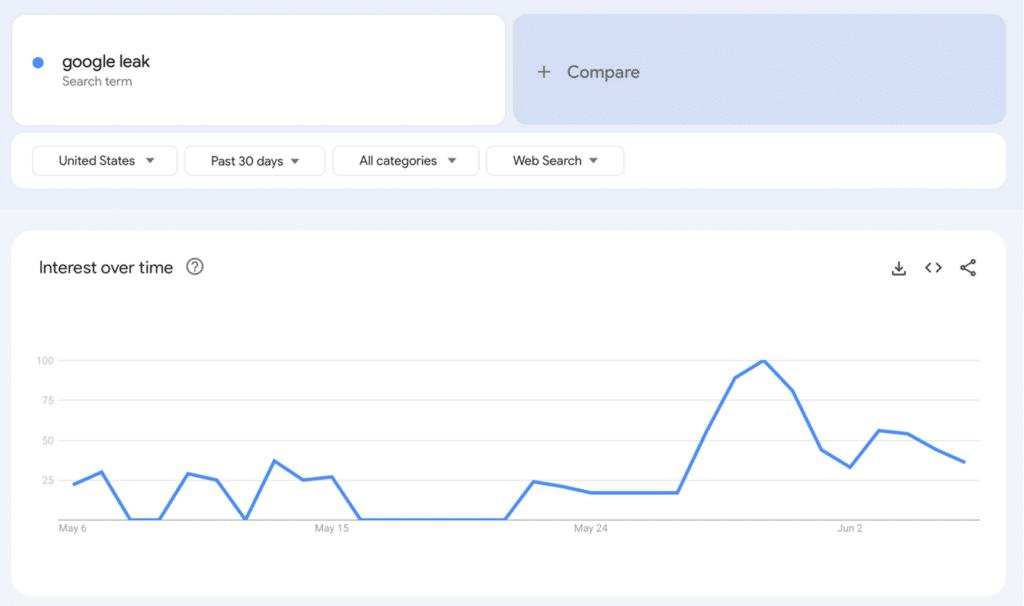Jump to:
Caveat: We’re still learning
The timeline of the API leak
What’s in the Google API leak?
Does this mean I need to change everything about my SEO strategy?
What does the Google API leak mean for small- to mid-sized businesses and law firms moving forward?
LaFleur Marketing: Your trusted marketing technology partner
If you even casually follow the SEO industry, you’ve probably heard about the recent Google API leak. In another life, I would have read the words “Google API leak,” felt my eyes glaze over, and continued scrolling the page looking for something that applied to me more.
I don’t want to overstate the leak, but even with all the nerdy terminology, it applies to you. Especially if you operate a small business or law firm.
Google accidentally shared its Content Warehouse API with the public, revealing more than 2,500 documents and 14,014 attributes that impact various aspects of Google’s platforms, including search, YouTube, and local search. It’s the largest known leak of Google’s secret sauce and raises hard questions about the company’s transparency and clarity regarding its ranking system.
Here, LaFleur Marketing breaks down what this leak means for marketers and business owners, providing insights and guidance on how to navigate this new information.
Caveat: We’re still learning
LaFleur and the SEO industry as a whole are still processing all the information from the API leak. This blog is an initial overview, and shouldn’t be considered a full assessment of the leak. We will continue to share insights and perspectives as we learn more.
The timeline of the API leak
As LaFleur’s director of compliance and content, I would be remiss not to say that Google’s accidental leak was an absolute failure of its compliance and data retention systems. Someone posted proprietary information on a publicly accessible website instead of the company’s enterprise accounts.
If you don’t have clear processes and protections for your sensitive information, consider this a kick in the pants. (And our friends at People IT can help strengthen your data strategy , if you’re not sure where to start.)
March 29, 2024: An automated bot seems to accidentally publish a copy of Google’s Content Warehouse API on GitHub. Initially, only a few people notice and share it, and it doesn’t gain widespread attention.
May 5, 2024: Efran Azimi, an SEO professional, shares the leaked documents with Rand Fishkin, founder of Moz and SparkToro. Rand and Mike King, a technical SEO expert, start to analyze the data.
May 27, 2024: Rand and Mike publish a series of blogs and videos about the leak. (If you’re looking for a detailed, technical assessment of the leak, check out Mike’s blog. He’s the kind of technical SEO who reads Google patents for fun.) Their content goes viral.

Google Trends data for “google leak,” showing significant spike in interest starting on May 27, 2024.
May 29, 2024: Google issues a statement minimizing the leak’s importance, cautioning against making assumptions based on potentially outdated or incomplete data.
Present time: SEO experts and practitioners around the globe are analyzing the leaked documents and trying to make sense of it all.
What’s in the Google API leak?
As mentioned above, Google’s Content Warehouse API contains more than 2,500 documents and 14,014 attributes. These attributes or features identify types of data that Google collects or considers as part of its work. The warehouse includes attributes related to search, YouTube, local, and many other aspects of its operations.
While we have not had time to analyze each and every attribute, there are some key takeaways.
- siteAuthority: Even though Google has denied the existence of “domain authority,” the warehouse includes a feature called “siteAuthority.” SEO experts like Rand Fishkin, who insisted that domain or site authority was real (and important), were most likely right.
- Size matters: The algorithm favors larger, well-known brands, even if their content is less helpful and informative than smaller brands. (This was also discussed during the recent DOJ hearings.)
- Page titles: Page titles are a likely factor in search results and not an outdated area for optimization.
- Clicks and user behavior data: Google’s algorithm seems to use data from clicks and user behavior on Chrome to prioritize content. Its internal tool, NavBoost, is getting a lot of attention due to its reliance on clicks. Clickstream data likely influences your rankings.
- Whitelisting sensitive topics: Google prioritizes authoritative sources (and minimizes less reliable content) when people search sensitive topics like COVID-19 and election information.
- Entity and authority building: While EEAT (Expertise, Authoritativeness, and Trustworthiness) isn’t explicitly referenced, you see a broad emphasis on building authority and expertise.
Does this mean I need to change everything about my SEO strategy?
Probably not because of the API leak. But maybe.
First, a lot of the early learnings from the leak align with what SEO experts have suspected for a long time. Even if Google denied the importance of “domain authority” and clickstream, many of us felt they had to be important. If you have a strong SEO strategy, you’re probably addressing a lot of these things already.
Second, the Content Warehouse API is a library of attributes, not a roadmap. Think of the APIs as LEGO bricks—and we don’t have the instructions for the set. Some of these features might be in use. Others might have been sunsetted or were only used in Google experiments. We don’t know how much weight each attribute carries.
Third, Google’s algorithms and APIs are continually changing. It’s notable that AI Overviews are not mentioned anywhere in the warehouse. We are seeing a snapshot in time—even if it is a fairly recent snapshot.
Finally, a list of APIs isn’t a strategy, and organic search doesn’t exist in a vacuum. Wil Reynolds, founder of Seer Interactive, said it well:
Does the Google algorithm leak help you understand your customer? No.
Does it help you better understand if your customer is getting answers somewhere other than Google? No…
Did we just find a ton of ideas to test. Yes.
Is a loophole a strategy? No…
Will those ideas help you stave off the fact that AI is a lower friction answer for customers, and they might go there? Or in private groups to get answers? Nope.
If you’re changing up your marketing strategy, you need to look much more broadly than the Content Warehouse API. You should also be considering how AI, social media, chat boards (like Reddit), and generational preferences are affecting the exchange of information.
RELATED:
What does the Google API leak mean for small- to mid-sized businesses and law firms moving forward?
While the SEO community continues to unpack the full implications of the leak, several early learnings have emerged:
- Diversify your marketing strategies: If you are an emerging or smaller brand, an SEO-only strategy might not be as effective as it once was—especially if you’re competing against larger, more influential brands and companies. Brand building, paid media, and social media should be important parts of your marketing strategy as well.
- Paid campaigns might boost your ranking: We’ve often noticed a correlation between running paid campaigns and organic performance. The leak suggests that this might be due to PPC’s ability to increase user interaction and clickstream data.
- Amplify your authority: Google prioritizes recognizable and trusted brands. Look for ways to bolster your firm or company’s authority, whether that’s through authoring articles, earning backlinks and unlinked mentions, or other earned media.
- Use more structured data: Structured data or schema can be used to help emphasize areas of expertise, your geographic locations, and to improve the way your company appears on search engine results pages (SERPs). This can improve your chances of being recognized as an authoritative source and grow your clickstream.
- Assess your SEO practices: If you haven’t done an SEO audit in a while, now is a good idea to do one. You might have some low-hanging opportunities to improve your website’s visibility.
- Test and adapt: As we learn more about the API leak, there will be many opportunities to test new strategies. Monitor the results closely and be prepared to adapt based on performance data. (And if you need help making sense of all that data, our soon-to-launch AI-powered dashboards can help.)
- Stay informed: Keep up with ongoing analyses and discussions within the SEO community. As more information is unpacked, staying informed will help you make better strategic decisions.
RELATED:
LaFleur Marketing: Your trusted marketing technology partner
The 2024 Google API leak offers a rare glimpse into the inner workings of Google’s search algorithm. While it’s important not to overreact or base entire strategies on this information, the leak does underscore the need for a diversified, data-driven approach to digital marketing.
For almost a decade, LaFleur has been a trusted marketing partner of law firms, professional service firms, and other growing businesses. If you have questions about the Google API leak or need a fresh, data-driven perspective on our marketing strategy, we’d love to talk.
References:
Fishkin, Rand. An Anonymous Source Shared Thousands of Leaked Google Search API Documents with Me; Everyone in SEO Should See Them. (2024, May 27). SparkToro. Retrieved from https://sparktoro.com/blog/an-anonymous-source-shared-thousands-of-leaked-google-search-api-documents-with-me-everyone-in-seo-should-see-them/.
Google Content Warehouse API, Hexdocs.
King, Michael. Secrets from the Algorithm: Google Search’s Internal Engineering Documentation Has Leaked. (2024, May 27). IPullRank. Retrieved from https://ipullrank.com/google-algo-leak.





